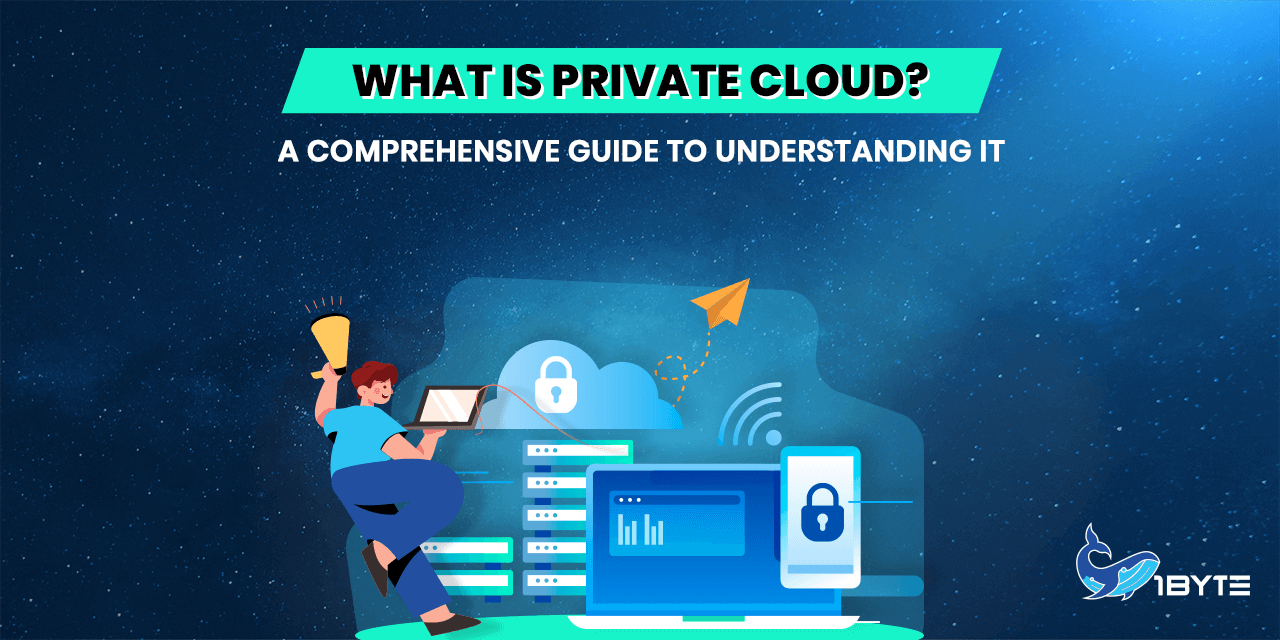In the world of cloud computing, private cloud is an increasingly popular option for organizations that require high levels of security, control, and customization. Unlike public clouds, which are open to the public and offer multi-tenant computing resources, private clouds are dedicated to a single organization. This means that the organization has full control over the infrastructure and can customize it to meet their specific needs.
In this comprehensive guide, 1Byte will delve into what private clouds are, how they differ from other types of clouds, and their key characteristics. We will also examine the use cases for private clouds and the benefits they offer. Whether you’re just starting to explore cloud computing or you’re looking to make an informed decision about which type of cloud is right for your organization, this guide has you covered.
What is Private Cloud?
In this first section, we will dive into the definition of private cloud and what sets it apart from other cloud computing solutions. In short, a private cloud is a cloud computing environment where the infrastructure and services are dedicated solely to a single organization. It provides the organization with complete control and customization over the computing resources, security, and privacy. This type of cloud computing solution is especially useful for organizations that require high levels of security, compliance, and customization for their business operations.
Whether you are new to cloud computing or an experienced IT professional, this section will provide you with a comprehensive understanding of what private cloud is, its features, and how it can benefit your organization.
1. The Definition of Private Cloud
The definition of private cloud is simple yet crucial to understanding in today’s rapidly evolving technology landscape. At its core, a private cloud is a computing environment that provides a dedicated set of computing resources and infrastructure, solely for the use of a single organization. These resources can be either on-prem or hosted by a third-party provider, but they are always isolated and secured to ensure that only the intended users have access to them.

In other words, a private cloud is like having your own personal, customized data center that is designed to meet your specific needs and requirements. It provides the organization with full control over its infrastructure, as well as complete visibility into the use and performance of the resources. This gives businesses the flexibility to scale their resources as needed, without having to worry about the security and privacy of their data.
Moreover, private clouds are designed to provide the highest levels of security and reliability, making them ideal for organizations that handle sensitive data, such as financial services firms, healthcare organizations, and government agencies. With a private cloud, organizations can ensure that their data is stored, processed, and transmitted in a highly secure and compliant manner, without having to sacrifice performance or scalability.
2. Private Cloud in Today’s World
The private cloud has become increasingly popular in today’s world as businesses look to take control of their IT infrastructure and improve data security. With a private cloud, organizations can enjoy the benefits of cloud computing while keeping their data and applications within their own dedicated environment. This allows for greater control and customization, as well as increased security measures that meet the specific needs of the organization.
One of the key drivers of private cloud adoption is the need for increased security. With high-profile data breaches making headlines on a regular basis, organizations are looking for ways to better protect their sensitive information. A private cloud provides a secure, dedicated environment that is isolated from the public cloud, making it an attractive solution for businesses with strict security requirements.
Another benefit of private cloud technology is the ability to meet unique and complex requirements. Private clouds can be customized to the specific needs of an organization, allowing for greater control and flexibility. This is especially important for businesses with complex IT environments, where standard public cloud solutions may not be sufficient.
In conclusion, the private cloud is becoming an increasingly popular solution for businesses looking to improve their IT infrastructure and data security. With the ability to customize the environment to meet specific requirements and provide enhanced security measures, it’s no wonder the private cloud market is expected to continue its rapid growth in the coming years.
Key Characteristics of Private Cloud
In this section, we’ll dive into the key characteristics that set private clouds apart from other cloud computing models. Understanding these characteristics will give you a better idea of what makes private clouds so appealing to businesses, as well as help you make an informed decision when it comes to choosing the right cloud solution for your needs. From control and customization to security and compliance, we’ll explore the features that make private clouds unique. Whether you’re already familiar with cloud computing or new to the subject, this section will provide valuable insights into the world of private clouds.
1. Private Infrastructure
The private infrastructure is one of the key characteristics of a private cloud. This refers to the computing resources that are exclusively dedicated to a single organization, rather than being shared with other customers. A private cloud provides organizations with greater control over the infrastructure, including the ability to customize hardware and software configurations to meet their specific needs. This level of control helps to ensure that the organization’s data and applications are secure, as well as providing greater flexibility in terms of scalability and reliability.
With a private infrastructure, organizations can also benefit from a more predictable and consistent performance, as they are not subject to the fluctuations that can occur in a public cloud environment. Additionally, private cloud infrastructures are typically housed in a secure data center, providing organizations with added peace of mind when it comes to the security of their data and applications.
2. Customizable and Tailored to Business Needs
Unlike public clouds, which are designed to be flexible and accessible to a large number of users, private clouds are built to meet the unique requirements of an individual organization. This means that businesses can choose the specific hardware and software configurations that best suit their needs, as well as the level of security and privacy they require.
For example, if a company has strict data privacy regulations, it can configure its private cloud to ensure that data is stored securely and only accessible by authorized personnel. This level of customization also extends to the management of the cloud itself. Businesses can choose how they want to manage and monitor their private cloud infrastructure, allowing them to maintain complete control over their data and applications.
This level of control and customization is one of the main benefits of using a private cloud. It ensures that a company’s IT infrastructure is optimally suited to its needs, which can lead to improved efficiency, cost savings, and a better overall user experience. Furthermore, the ability to tailor a private cloud to meet specific business needs can provide organizations with a competitive advantage, as they are able to use technology to support their unique business processes and workflows.
3. Higher Security and Compliance
The security and compliance of sensitive data is a top priority for businesses of all sizes. With private cloud, companies have the added assurance that their data is being protected in a secure, private environment. Unlike the public cloud where resources are shared among multiple users, private cloud infrastructure is dedicated solely to a single organization. This ensures that security measures are fully in control of the organization and can be customized to their specific needs.

Private cloud providers also typically invest in state-of-the-art security technologies such as firewalls, intrusion detection systems, and data encryption to protect sensitive information from potential threats. In addition, the private cloud often offers the ability to meet various industry-specific regulations and standards, such as HIPAA for healthcare organizations, PCI DSS for payment processing, and FISMA for government agencies.
Moreover, the private cloud also offers a higher level of data control and privacy. With the public cloud, it can be difficult to monitor who has access to data and where it is being stored. With a private cloud, however, businesses can monitor and control data access within their own organization, providing peace of mind and protecting against unauthorized access or misuse.
In conclusion, the higher security and compliance provided by private cloud infrastructure is an important factor to consider for organizations handling sensitive data. Whether it’s to meet industry-specific regulations or just to ensure the privacy of valuable information, a private cloud can offer the peace of mind that is so critical in today’s fast-paced business environment.
4. Improved Control and Management
The improved control and management feature is another key characteristic of the private cloud. With a private cloud, businesses have complete control over their infrastructure and can tailor it to meet their specific needs. This includes the ability to manage resources, monitor performance, and adjust configurations to optimize the system. This level of control gives organizations the ability to quickly address any issues that may arise and ensure the smooth operation of their cloud environment.
In addition, private clouds often include tools and features that simplify management and provide a centralized location for monitoring and managing resources. This makes it easier for organizations to maintain their cloud environment and ensure that it is running optimally.
Use Cases of Private Cloud
In the world of cloud computing, private clouds are gaining popularity for a variety of reasons. With a private cloud, businesses can enjoy a high level of customization and control over their computing environment, while still leveraging the benefits of cloud technology.
In this section, we’ll explore some of the most common use cases for private clouds, so you can gain a better understanding of how this technology can be applied to solve real-world business problems. Whether you’re looking to enhance your data security, increase efficiency, or reduce costs, a private cloud can offer a solution that is tailored to your unique needs. So, let’s dive in and see how private clouds are being used to drive business success.
1. Business-Critical Applications
Business-critical applications are a key area where private clouds are often utilized. These are applications that are vital to the operations of a business, and their interruption or failure can result in serious consequences. Examples of these applications include financial systems, customer relationship management (CRM) systems, and supply chain management systems. In these cases, the need for high levels of security, reliability, and performance is paramount.
Private clouds provide the necessary level of control and customization to meet the specific needs of these business-critical applications. This includes fine-tuned security measures, the ability to customize infrastructure, and the ability to quickly scale resources as needed. As a result, businesses can trust that their most important applications will remain up and running, even in the face of changing business demands or unexpected spikes in traffic.
Additionally, private clouds offer the ability to manage and monitor applications in real time, ensuring that any potential issues can be detected and addressed before they cause any disruption to the business. This level of control and visibility is especially important for business-critical applications, where any downtime can result in significant financial losses or damage to the business’s reputation.
2. Regulated Industries
Regulated industries, such as healthcare and finance, have specific requirements for the handling and storage of sensitive data. A private cloud provides the necessary level of control and security to ensure compliance with industry regulations. The ability to customize the infrastructure to meet specific security needs and the higher level of security offered by a private cloud make it an attractive option for these industries. In addition, a private cloud can provide the necessary reliability and availability to support critical business operations, which is particularly important in industries where downtime is not an option.

For example, in the healthcare industry, private clouds can be used to store electronic health records (EHR) and personal health information (PHI). The need for a secure and compliant infrastructure is particularly important in this industry, as the loss or unauthorized access to PHI can result in significant financial penalties. In the finance industry, private clouds can be used to store financial data and support critical financial applications, such as trading systems. The private cloud provides the necessary level of security and control to ensure the protection of sensitive financial data.
By utilizing a private cloud, regulated industries can ensure that their IT infrastructure is in compliance with industry regulations and secure enough to protect sensitive data. This allows these industries to focus on their core business operations and customers, rather than worrying about the security and reliability of their IT infrastructure.
3. Large Enterprises
Large enterprises often have a diverse range of computing needs, from managing vast amounts of data to running complex applications. Private clouds provide the level of customization and control necessary to meet these demands, making them a popular choice among large enterprises. Some well-known examples of companies using private clouds include Walmart, GE, and Procter & Gamble.
Walmart, for instance, has been leveraging the private cloud to manage its extensive retail operations, which include more than 11,000 stores in 27 countries. The company uses the private cloud to run its business-critical applications, such as inventory management, financials, and supply chain management. Walmart’s private cloud has allowed it to achieve higher levels of efficiency and agility, enabling the company to respond quickly to changes in customer demand and market conditions.
GE is another example of a large enterprise that has adopted private cloud technology. The company uses a private cloud to run its complex manufacturing operations, which include developing and producing products for a wide range of industries. By leveraging the private cloud, GE is able to reduce the time and cost of product development, increase collaboration between its engineering teams, and improve the overall efficiency of its manufacturing processes.
Similarly, Procter & Gamble, the multinational consumer goods corporation, has also embraced private cloud technology. The company uses the private cloud to run its mission-critical applications, such as customer relationship management, supply chain management, and financial reporting. With the private cloud, Procter & Gamble has been able to enhance its operational efficiency, improve decision-making capabilities, and increase collaboration among its various departments.
In conclusion, large enterprises are among the key adopters of private cloud technology due to the level of customization and control it provides. Companies like Walmart, GE, and Procter & Gamble are great examples of the benefits that private clouds can bring to large enterprises, including improved efficiency, agility, and collaboration.
Conclusion
Private cloud is a solution for organizations that prioritize security, customization, and control over their IT infrastructure. It provides numerous benefits such as improved security and compliance, higher control and management, and customization tailored to specific business needs. With the rise of digital transformation and the increasing demand for secure and reliable cloud computing solutions, private cloud is becoming an increasingly popular option for businesses of all sizes.

